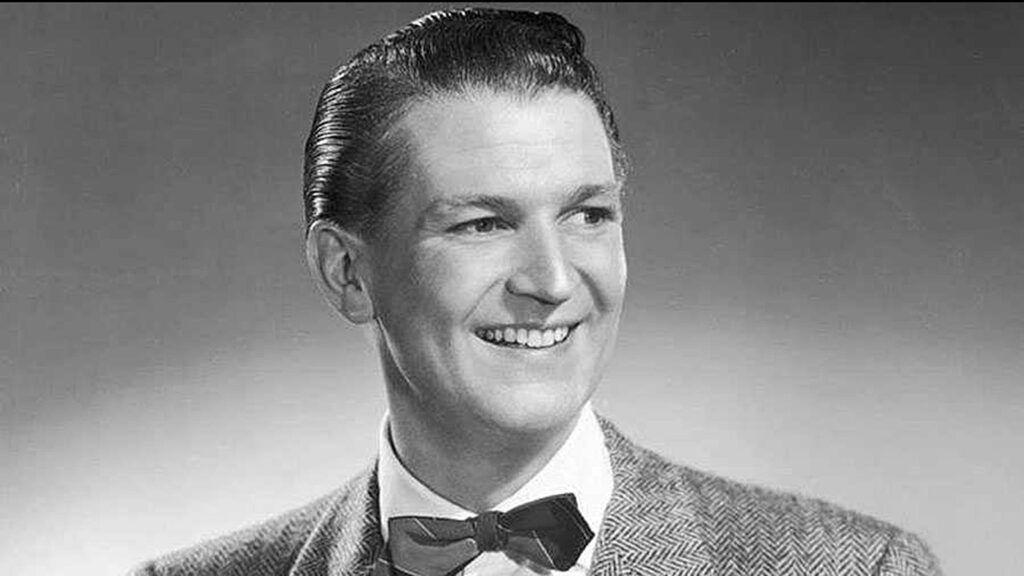It happened on a rainy fall night nearly twenty years ago. Almost unnoticed, the stranger slipped in and took a seat in the rear of the room. Toward the end of the meeting, he stood up, asking to be recognized. Once he spoke, nothing was the same with our group ever again.
Until that moment we’d been a rather comfortable little church group, not unlike hundreds of others. Our particular group met every Sunday evening during the school year m a basement classroom of the Broadway Presbyterian Church in New York.
Since we were near Columbia University, we often had students drop in who were not part of the regular group; so on that rainy night when the stranger stood up, asking to be recognized, no one paid any particular attention.
READ MORE: MONTY HALL ON THE VALUE OF FAMILY
“My name is Alfred Wall,” the stranger began. “I come from Texas, and I’m a freshman at Columbia, like most of you. May I take part in your discussion…”
The stranger paused for so long that several of us gave him friendly nods. Then, abruptly, he dropped his little bombshell.
“…because I don’t believe in your ideas. I’m an atheist.”
From that instant, of course, Alfred Wall had our complete attention. Everyone turned to examine him. Al was about the same age as the rest of us—in his late teens. He was not a handsome boy. He was lanky; his nose was too large; he had a square jaw that went well with his rather blunt personality. Now that he’d jolted us into attention, he didn’t seem ready to say anything more. And then we all spoke.
“Of course you can join in … Certainly … Everyone does … Our ideas can stand challenge.”
“Thank you,” Al said, bowing slightly from the waist. Immediately he fired his opening shot. “Your belief in the story of Christ. To me, this is like believing in some fairy tale. How can you prove it’s true?”
We looked at each other. “Well … the Bible. Of course, the Bible is our main source…”
“But the Bible was set down by men. Men are full of error. So why not your Bible?”
Several of us spoke up, but our answers were vague. They amounted to saying, “The Bible is truth.”
“Now really!” Al said. “What do you mean by that?”
That evening our answers satisfied neither Alfred Wall nor others in the group. Lacking facts, we argued. In closing the meeting, someone suggested that if we were going to defend our beliefs against Mr. Alfred Wall, we’d have to sharpen our own thinking.
READ MORE: MIKE DOUGLAS ON EMBRACING PRAYER
During the next few weeks, however, while our approach to Al Wall was one of friendly acceptance, it became increasingly clear that we would, indeed, have to sharpen our thinking. Al’s penetrating questions were making us look like fools.
Word soon spread over the Columbia campus. Much to our chagrin, new people came to watch the fun—but they stayed to take part in the arguments. By the end of Al’s first semester, we had doubled our attendance, and in the middle of the second semester, we had to move to larger rooms.
And all the time, Al kept up his relentless heckling. But we were gradually coming up with some better answers, too. The next time Al brought the Bible under attack, it was plain that several of the members had given the matter some thought.
“I think there is a yardstick for truth that you can use for the Bible, Al,” one of the members said. Its increasing influence.”
Another member picked it up. “Falsehood dies; truth lives. In thousands of years, the influence of the Bible hasn’t lessened; it’s grown.”
“Still, even after these thousands of years, the majority of people in the world do not accept Christianity” said Al, and backed up his argument with fact and figures.
By the end of Al’s freshman year, we knew definitely that we would have to improve our tactics. We’d have to do more than simply sharpen our thinking. One night, just before vacation, several of us decided that over the summer vacation we would re-read and study the entire Bible, get out textbooks on religion, and see if we couldn’t come up with some better answers for Alfred Wall. Our minister, too, was pleased by this plan.
For the first time in our lives, that summer Bible reading became a matter of personal concern for us.
READ MORE: ED SULLIVAN ON THE POWER OF PRAYER
I remember so clearly the first session of Al’s. sophomore year, when we were going to discuss the divinity of Christ. On that night there was an unusually large crowd. Toward the end of the discussion, Al stood up. He cleared his throat.
“There is something I would like to say,” he began, and several of us smiled politely with him. That phrase had become his signature. Then Al gave a terse speech, ending with “… And how can you claim Christ is divine when nowhere in the Bible does he himself say, ‘I am God.’?”
Al was barely seated when there was such a clamor for the floor that we had to appoint a moderator.
“Christ did tell His disciples that He was divine,” said one of the members. “When Simon Peter asked Jesus if he were the Son of God, Christ said, ‘Blessed art thou, Simon: for flesh and blood hath not revealed it unto thee, but my Father which is in Heaven.’” *Matthew 16:17
“Where else?” said Al.
More hands raised. “… Jesus said, ‘I and the Father are one!’ ”
He also said, ‘He that hath seen me hath seen the Father.’ ”
Other sources were quoted, showing the results of extensive study.
And then it was that one of the girls in the group who seldom entered the discussions spoke up.
“I think a lot of us are missing an important point,” she said. “Christ wanted His disciples to grow spiritually. He didn’t command them to believe. He wanted them to grow into their own conclusions about whether or not He was divine. Why don’t you try that, Al?”
Al leaned forward with a strangely serious, dead-pan expression.
“What was that?” he said.
The girl repeated her idea, and for the rest of the evening, Al seemed reflective. That night we argued until after midnight. Similar discussions followed on the next Sunday. And the next. All through Al’s sophomore year. But never once did he give ground. During his junior year he kept coming up with questions that punctured other balloons of ignorance or blind acceptance.
READ MORE: JUNE LOCKHART ON WHERE TO PRAY
Then Al’s senior year was suddenly upon us.
Four years had passed. I don’t think it’s any exaggeration to say that we were an entirely different group from what we had been when Al first came with us. We’d found new personal strength and vitality in our religion, were surer of our beliefs, especially regarding Christ’s divinity.
But Al himself always seemed the same steadfast atheist. It was frustrating. We wondered if Al would ever break down and admit he had gotten at least something out of our discussions.
Then came the last meeting of Al’s last year in school. And, as usual, Al rose to his feet.
“There’s something I would like to say,” he began and this time every one in the room did smile.
“I think a lot of you may have come here tonight hoping to hear that I’m ready to join the church or something. Well, after four years of debating, I’ve come to one very definite conclusion.”
Al always had a keen sense for the dramatic. No actor ever had a more quiet, fascinated audience.
“Your arguments just haven’t convinced me.”
Al sat down.
At first we were at a loss for words. There were a few disappointed, half-whispered comments:
“Well, that’s all right, Al … We all come to our own conclusions.”
READ MORE: ARLENE FRANCIS ON LISTENING LOUDER
Then Al stood up again with a mischievous smile on his face and began to speak. I noticed that he closed his eyes and folded his arms in a gesture he used when he had planned a speech.
“Please, pay attention to just what I said,” Al started. “Because I want to emphasize a point. I had always approached religion as if it were an argument to be won or lost. But do you remember that meeting when one of you said that Christ wanted his disciples to grow into their own conclusions about his divinity? I decided to try that myself.
“I decided to recreate the experience of the disciples. By reading and by prayer, I tried living as closely to Christ as I could. I walked with him, as it were, for three years. I put myself under his disciplines. And I discovered an amazing thing. I think I had always been afraid that having a religious life meant changing myself into some different person. It’s not like that at all.
“When he was on earth, Christ did not try to force James to be like John, or Peter like Philip. He didn’t lead his disciples by regimentation; but by stimulation. It’s the same today. So that’s why I say that your arguments haven’t convinced me. The divinity of Christ is not a theological argument. The divinity of Christ is an experience.”
Al walked up to the front of the room and sat down at the edge of the table. “And I would like to say,” he almost whispered, “that because I have known that experience, I want to join the church.”
Well, that’s all there is to the story. Al left us as suddenly as he had come, and after awhile I lost track of him entirely. But I shall never be the same for having known him. Others felt just as I did.
And yet today, 20 years after, it all seems just a little too pat. Lately one question has begun to puzzle me. Run back over these events yourself, and see what you think…
Could it be that Al was a unique, unconventional kind of evangelist? Could it be that his challenge was just a way of forcing us to know our own religion? Could it be that Al Wall was never really an atheist at all?
For more inspiring stories, subscribe to Guideposts magazine.





